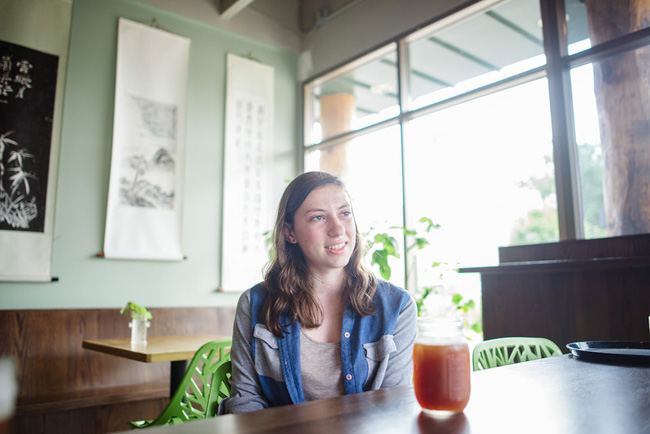
Heavy Table’s 12th North Coast Nosh takes place next Friday night at Open Arms of Minnesota. To help preview the event, we did a deep dive interview with one of our new purveyors, Eva Duckler of Tree Fort Soda.
That Verdant Tea in the Seward neighborhood of Minneapolis is one of the foremost flavor laboratories in the Twin Cities is now an open secret. From the shop’s remarkable teas to the ice creams of the co-located Sweet Science to Verdant’s killer chai, elegant kombucha, and remarkable noodle dishes, the collective continues to bang out tastes that keep us on the edge of our seats.
Now the team has moved into the realm of summer Americana: the root beer and ginger ale of the newly founded Tree Fort Soda company. Helmed by 17-year-old Eva Duckler (the younger sister of Verdant proprietor David Duckler), Tree Fort is a high school project turned bona fide business that Eva hopes to keep alive and kicking even after heading off to Wellesley College this fall.
HEAVY TABLE: For how long have you been working on Tree Fort Soda?
EVA DUCKLER: This is super recent. I’ve been working at Verdant for a couple months now, and I’ve started helping out with the specialty drinks here, so I was making the syrups to mix in with soda water or steam up with milk. So I started making root beer just for fun. It was a pretty big hit, and it’s something that I’ve always loved. And David and I have always shared a passion for trying all the weird brands of soda that we can find, so it was just this weird fantasy that started coming true as we went along.
I had a project at the end of my senior year at Blake high school — it was a mini thesis. We had two weeks off, but we had to do something. So I wrote a business plan and filed for an LLC, just kind of for fun and to see where that led…
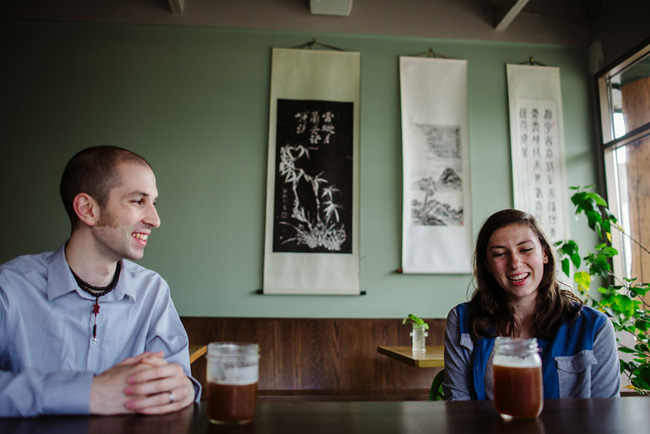
DAVID DUCKLER: Remember when I asked you what you’d do with a million dollars when you were like four or something…
EVA: We’d ask each other, “If you had a million dollars, what would you do? I’d always say I’d start my own root beer brewery.
DAVID: Don’t need to wait for the million dollars.
HEAVY TABLE: How do you make root beer?
EVA: It’s really simple. You just steep out a bunch of herbs using water extraction. I don’t use any extracts except for vanilla extract. It’s all extracted in house. Then you caramelize some sugar and add some honey, and that’s what you get. And then you carbonate it in a keg. Sarsaparilla is the classic root beer flavor. But a lot of vanilla is really important. A lot of people feel strongly about using anise, so there’s a little anise, but that wasn’t a flavor that I always loved when I was trying them, so I got to customize it to my taste.
HEAVY TABLE: The flavor is really layered and balanced: a lot of herbal kick to it, but it’s balanced by a rich, full sweetness. From the bottle it was a little thin, texture-wise, but it was more luscious on tap. Either way, really different from mainstream root beers.
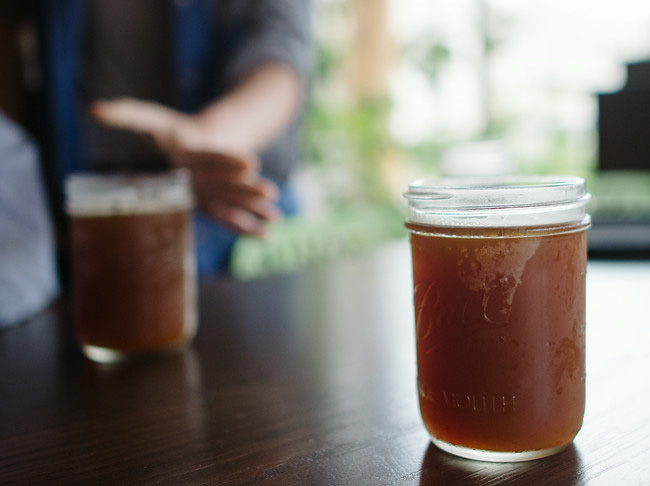
EVA: It’s crazy different. If you tried it side-by-side with Barq’s or A&W, it wouldn’t taste anything like them. We don’t use any artificial flavors or colors or high fructose corn syrup to sweeten it. It’s like what I’d like to think root beer tasted like back at its origins in the 1800s, when people were just drinking it made from roots, or fermented and alcoholic. It’s really different from what you’d expect, but it has the herbal notes you might expect from any major brand.
HEAVY TABLE: How are you going to balance this business with going away to college in the fall?
I’ve been thinking a lot about how to balance it, because I don’t want to give this up. I don’t think this is my life career. It’s a dream, but it’s not what I see myself doing in 40 years. But it’s a really cool project that’s grown into something that’s sort of taking over my life now. And I’m so glad I get to do it with David because he has a lot of expertise to help me out with it, and [he] helps me run things when I’m not around.
DAVID: We’re looking at warehouse spaces now so that we can build out a brewery. We’re investing in all these stainless tanks and glycol-chilled fermenter vats, and we’re actually getting a small, small bottling line and a bottle labeler and capper. We’re making some investments, and it’s good that it’s split between kombucha and soda. They’re two different companies that’ll be cooperating and working together.
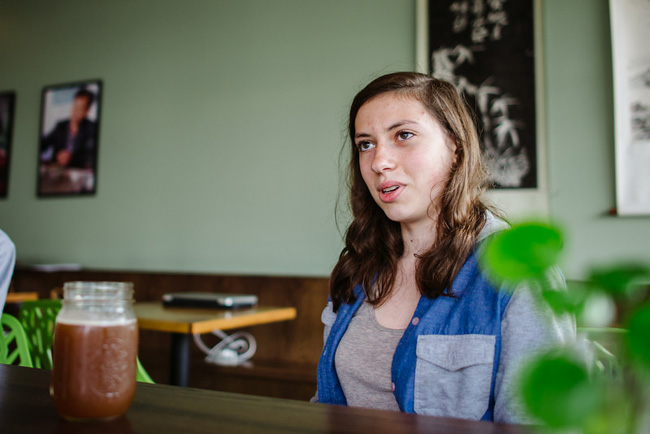
HEAVY TABLE: What’s your distribution like?
EVA: I am distributed by Classic Provisions. Because it’s a one-person operation, it’s hard to get to the volume we need… to distribute it more widely around the Cities. … In the next couple weeks you’ll see it at the Seward Co-op and the Linden Hills Co-op. But soon it’s going to be all over the place. People have been reaching out to me with interest.
DAVID: We went over to the Linden Hills Co-op. We didn’t even tell anyone we were coming; we just brought a couple bottles of root beer and asked for the grocery buyer and showed it to them, and they looked at it and listened to the story and said, “Yeah, OK. I can make some room on my shelves. How about next week?” It’s actually a lot easier to sell than chai and kombucha and tea! Everybody knows what root beer is; everybody loves it; it’s so approachable. People’s Organic is going to be carrying it at five locations…
EVA: It’ll be sold by the four-pack. And single-serving bottles in deli cases.
DAVID: Our prices will be very comparable to Fentimans, about $2.49 a bottle and $8.99 for a four-pack, something about that range. The staggeringly expensive thing about getting started in bottled drinks is the cost of bottles and labels. The more you scale up, the cheaper they become. Just to give you a sense, the bottle by itself costs about 40 cents, and the label costs 44 cents: 84 cents of the bottle are tied to the packaging.
EVA: This drink is totally natural, and it’s all really high quality ingredients… but it’s crazy that the biggest cost is the packaging.
HEAVY TABLE: Who makes your honey?
EVA: We work with both Ames and The Beez Kneez when we can.
DAVID: The Beez Kneez supply is more and more limited.
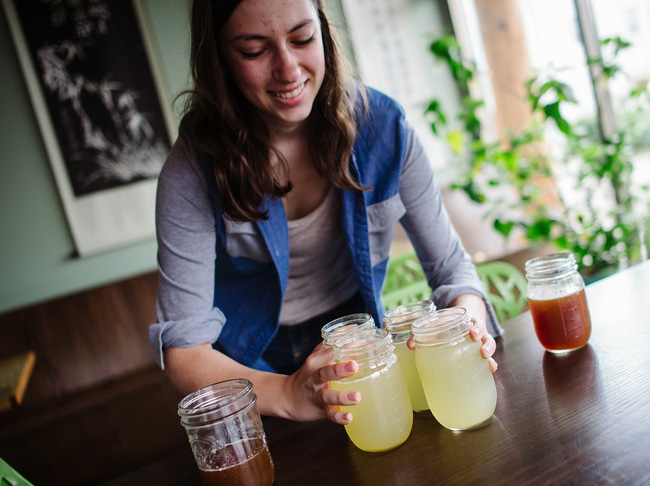
HEAVY TABLE: This ginger ale has a hell of a kick. Tell us about it.
EVA: The ginger ale is super spicy and dry. It’s not like the final product yet, but we like the spiciness. There’s no galangal or anything in there. It’s just straight, fresh ginger, but it really lingers.
DAVID: If you’re paying $2 or more for a bottle of soda, your expectations are going to be altered – you want it to have enough confidence in itself to go somewhere different.
EVA: I think it needs to be a little more sweet.
HEAVY TABLE: Obviously both of you guys are well-educated, but you’re working on craft-focus food projects. Are things changing in terms of what people view as worthwhile work?
EVA: David and I have talked a lot about the craft revival over the past few years — using locally grown and sourced foods, and really caring about everything. It makes me feel confident for my generation…
DAVID: Growing up, to be successful you had to be a doctor or a lawyer, but now our cultural heroes are bartenders, bakers, chefs… people who are working with their hands and creating something. Now those are very respectable professions again instead of just jobs. Our parents were surprised by the things we’re doing. I went to school for international relations, and I was supposed to do that.
EVA: I always said, “Hell no I’m not starting a business… ”
DAVID: Both our parents are entrepreneurs, and they always told us: don’t ever start a business unless there’s nothing else in life that makes you happy.
EVA: They did say that — over and over again.
HEAVY TABLE: Moving forward – what’s the next move for Tree Fort? Any new flavors coming down the pike?
EVA: We’re probably going to have a cola and a cream soda out by the end of the year. I’d like to play with some crazy flavors too, like rose hips and citrus… It’s been a blessing for me to have this kitchen back here to play around with.
Try Tree Fort Soda and more than 20 other local artisan food products at North Coast Nosh XII at Open Arms on Friday, Aug. 15.

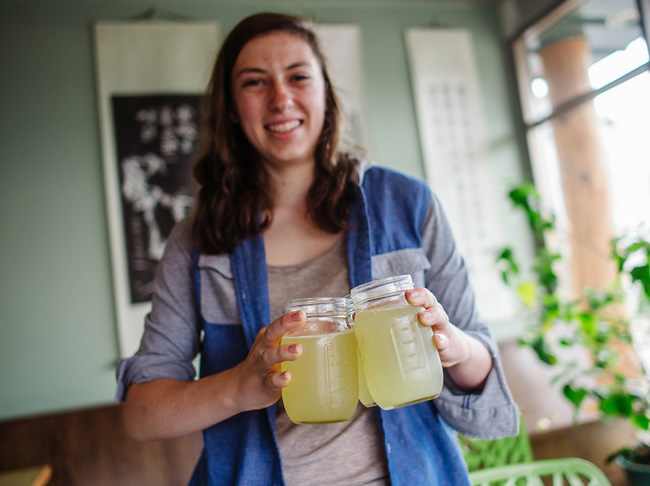
I enjoy ‘Vernors’ when I can find it. Unusual taste. Bottle and label costs feel excessive.
‘Tabasco’ started small. Protect everything — formula, bottle, label, etc. Design
much MYSTERY into your product. Offer regular ‘tastings’. My salute.